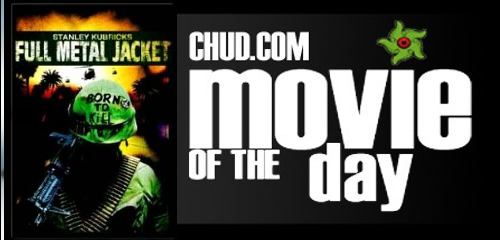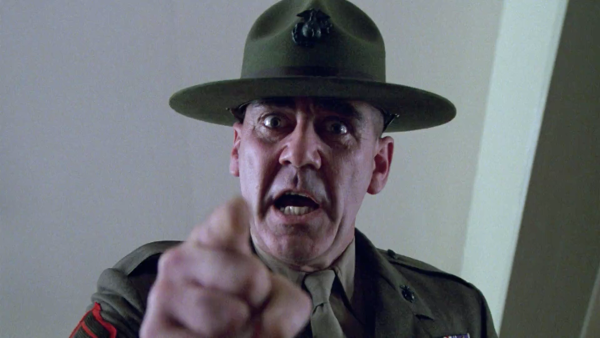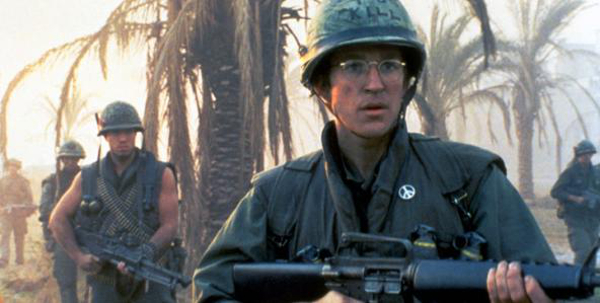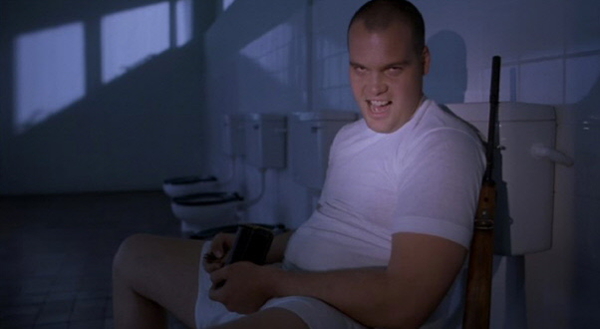The Film: Full Metal Jacket (1987)
The Principals: Stanley Kubrick (director), Matthew Modine, Adam Baldwin, Vincent D’Onofrio, R. Lee Ermey, Arliss Howard
The Premise: War is hell. This movie’s okay, though.
Is it any good? Much of it is, yes. As with any film that’s episodic by design, some parts are going to work better than others. And while nothing’s really bad (because c’mon, this is a Stanley Kubrick film), the movie as a whole doesn’t live up to the promise of its best moments.
So what works? The opening scene, for starters. Not the one everybody remembers, with R. Lee Ermey’s Sergeant Hartman tearing every private a new asshole – I’m talking about the brief montage of new Marines in the barber chair, their hair hitting the floor. A montage can speak a million words (even Rocky had one, after all), and this encapsulates the essence of what we’re about to see: Full Metal Jacket is a movie about losing your illusions, vanity, and identity. At a metaphoric and practical level, this is the perfect place to start.
What else works? For starters, the supporting cast is stellar. Vincent D’Onofrio’s performance is a revelation (I’d argue that more people today think of D’Onofrio than Jim Nabors when they hear the name Gomer Pyle), and the scene where he gets his comeuppance on Hartman is the only time the movie truly felt electric and dangerous to me. D’Onofrio manages to evoke two classic Kubrick protagonists (Jack Torrance and Alex DeLarge) here, and yet the performance is truly his own. And Ermey is scary, hilarious, authentic — a worthy antagonist for him, and truly human by the end. And Adam Baldwin plays proto-Jayne Animal Mother with profane verb and gusto.
The dialogue is also great – if you haven’t seen FMJ in awhile, it might shock you how many lines you’ve heard repeated in conversation. Although it’s become cliché for movies about Vietnam to be ironically scored with songs from the sixties, Kubrick’s choices here are stellar and contribute to the narrative. And the final shootout with the Vietnamese sniper is a fantastic setpiece.
What doesn’t work? Well, I’ll defer to Roger Ebert on that one: “… it has been so long since [Kubrick] allowed spontaneous human nature into his films that he no longer knows how”. This is why we remember lines from this movie more than scenes – emotion comes in isolated moments, and our engagement with the material slips and returns. While Joker’s central arc works, it’s still not nearly as affecting as watching those of Captain Willard, Ron Kovic, or the guys from The Deer Hunter, and the casting of Modine doesn’t help matters – he’s a blank slate in this role, glib without depth. Although we can see what he goes through, we don’t feel it – we have to have it narrated to us. It’s odd that Kubrick could make Humbert Humbert a fully realized, empathetic character and yet fail to make us truly care about young boys at war (either that, or I just have deviant sympathies).
Random anecdotes: Anthony Michael Hall was Stanley Kubrick’s first choice for Joker, and spent eight months prepping and training for the shoot… at which point negotiations broke down over salary and schedule. Disappointing – the role seems tailor-made for mid-80’s Breakfast Club-era Hall, and his casting would’ve been great shorthand to get the audience to invest.
This was both R. Lee Ermey’s breakthrough on-screen and his most iconic role, but getting it wasn’t easy. After failing his initial audition (and ultimately being hired as a consultant for the boot camp scenes), Ermey shot a 15-minute video where he improvised obscene insults while being pelted with oranges and tennis balls without pausing, flinching, or repeating himself. When this still didn’t convince Kubrick, Ermey went to Kubrick on set and flat-out asked him for the role. Kubrick said “no” again, and Ermey shouted at him to “stand up when spoken to”, with full drill-sergeant gameface. Finally, Kubrick acquiesced; and the original actor contracted to play Hartman (Tim Colceri) got demoted to the role of “Helicopter Door-Gunner”. For his trouble, he was rewarded with a Golden Globe nomination, and a career playing badasses. (Has that video ever surfaced? It needs to.)
Much of FMJ’s cultural impact comes directly from Ermey – the majority of his dialogue in the Parris Island sequences was improvised, and apparently he had to personally explain to Stanley Kubrick that a “reach-around” was a common courtesy.
Not an anecdote, but a musing: when the inevitable movies about the Iraq War happen, what music will wind up on the soundtrack?
Cinematic Soulmates: Platoon. Born on the Fourth of July. Jarhead.



